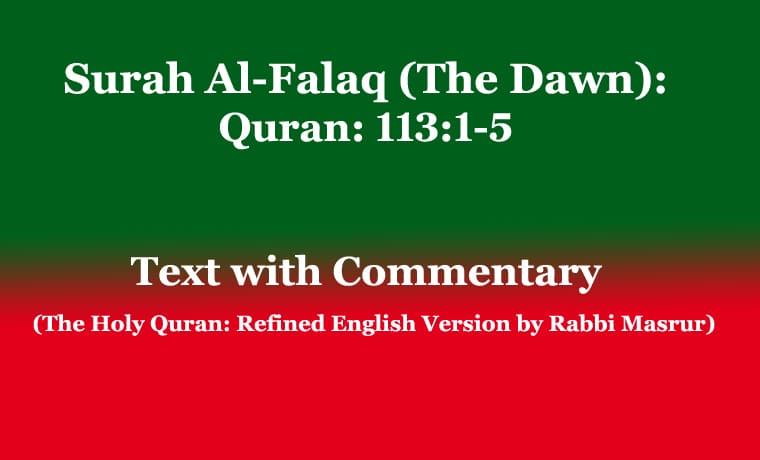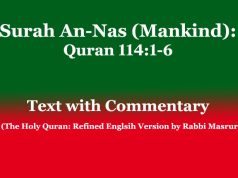“Explore the profound meaning and commentary of Surah Al-Falaq (The Dawn), a powerful prayer for protection from external and spiritual evils. Discover its themes, significance, and practical applications for daily life.”
Surah Al-Falaq (The Dawn): Text with Commentary
Surah Al-Falaq (The Dawn): Text
In the name of Allah, the Most Gracious, the Most Merciful
- Say: I seek refuge with the Lord of the Dawn
- From the harm of everything created by Him
- From the harm of Darkness as it overspreads
- From the harm of those who practice witchcraft when they blow on knots.
- From the harm of the envier when he envies.
Surah Al-Falaq (The Dawn): Commentary
Surah Al-Falaq (Chapter 113 of the Quran) is one of the two “Mu’awwidhatayn” (chapters of seeking refuge) along with Surah An-Nas. This chapter is a prayer for protection from external evils.
Occasion of Revelation
The specific context of the Surah’s revelation is traditionally linked to an incident involving the Prophet Muhammad (peace be upon him). According to various narrations:
Incident of Sorcery: A man named Labid ibn al-A’sam, who was knowledgeable in sorcery, reportedly cast a spell on the Prophet Muhammad (peace be upon him) using items such as hair and a comb, tying knots and burying them under a well. This resulted in physical effects on the Prophet, such as fatigue or a sense of unease, though his spiritual and mental faculties remained unaffected
Divine Guidance: Allah revealed Surah Al-Falaq and Surah An-Nas to the Prophet as remedies. The verses were recited, and the knots were untied one by one, lifting the effects of the spell completely.
Purpose of Revelation
The Surah was revealed to emphasize:
- The reality of external and supernatural harm, such as envy and sorcery.
- The need for reliance on Allah as the ultimate protector against all forms of evil.
- The importance of spiritual practices, such as seeking refuge through Quranic recitation, to maintain physical, mental, and spiritual well-being.
Lessons from the Revelation
- Reliance on Allah: The Surah reinforces the importance of turning to Allah alone for protection from all evils, seen and unseen.
- Awareness of Harm: It highlights the existence of negative forces in the world, including envy and malicious intent, and the power of seeking divine refuge.
- Practical Use: The verses are used in daily prayers and supplications as a means of warding off harm, showing their enduring relevance in the lives of believers.
Verse by Verse Explanation
1. “In the name of Allah, the Most Gracious, the Most Merciful”
This phrase, known as the Bismillah, is a declaration of the believer’s reliance on Allah for mercy and guidance. It sets the tone for the Surah by emphasizing Allah’s mercy and omnipotence, encouraging the believer to turn to Him for protection.
2. “Say: I seek refuge with the Lord of the Dawn”
- Instruction to Say: The command “Say” is significant as it highlights that the believer is directly being taught to utter these words as a personal invocation.
- Lord of the Dawn: Dawn symbolizes the emergence of light from darkness, representing Allah’s ability to bring clarity, safety, and renewal. By referencing “the Lord of the Dawn,” the Surah underscores Allah’s power to protect and dispel harm.
3. “From the harm of everything created by Him”
- Acknowledgement of Creation: This verse reminds believers that everything in existence is created by Allah, whether it is beneficial or potentially harmful.
- Protection from Harm: The phrase seeks Allah’s refuge from the harm that may arise from His creations, which can include natural phenomena, animals, or human actions. It emphasizes the believer’s reliance on Allah’s mercy and power over all that exists.
4. “From the harm of Darkness as it overspreads”
- Darkness as a Metaphor: Darkness often symbolizes uncertainty, fear, and the unseen. It may represent literal nightfall, which traditionally has been associated with danger, or metaphorical darkness, such as ignorance, evil, or despair.
- Seeking Refuge: The verse acknowledges that night can bring hidden dangers, and the believer seeks protection from any harm that might emerge under its cover.
5. “From the harm of those who practise witchcrafts when they blow on knots”
- Witchcraft: This verse directly refers to malevolent practices such as sorcery or black magic, particularly the act of blowing on knots, a ritualistic method used to cast spells.
- Significance: Such practices are condemned in Islam as they involve invoking powers other than Allah. This verse underscores the believer’s dependence on Allah to neutralize the potential harm from these practices.
- Broader Meaning: It also includes protection from manipulation, deceit, and harmful intentions, whether spiritual or psychological.
6. “From the harm of the envier when he envies”
- Envy as a Source of Harm: Envy is considered a destructive force that can lead to ill will, malice, and harm. It often stems from dissatisfaction and a failure to recognize Allah’s blessings upon oneself and others.
- Seeking Protection: By seeking refuge from the harm of envy, this verse encourages believers to guard themselves against jealousy and its repercussions while trusting Allah for protection.
Themes and Lessons from Surah Al-Falaq
- Acknowledgement of External Evils: This Surah highlights various sources of harm—natural, human, and supernatural—prompting believers to recognize their vulnerabilities.
- Reliance on Allah: It teaches that true protection comes only from Allah, reinforcing the concept of Tawhid (the oneness of Allah).
- Spiritual Immunity: The recitation of this Surah acts as a spiritual shield, particularly against hidden dangers like envy and sorcery.
- Self-awareness and Positivity: Believers are reminded to avoid engaging in envy or harmful practices themselves, promoting a society based on mutual goodwill.
Practical Applications
- Daily Recitation: Surah Al-Falaq is often recited in daily prayers and before sleeping as a means of seeking Allah’s protection.
- Trust in Allah: It encourages believers to depend entirely on Allah rather than fear or obsess over harm from others.
- Avoiding Harmful Practices: It serves as a reminder to abstain from actions like envy and manipulation that can cause harm to others.
Conclusion
Surah Al-Falaq is a profound reminder of human weakness and the need for Allah’s protection. It encompasses a comprehensive prayer for protection from all forms of evil, external and internal, tangible and intangible. By seeking refuge with the Lord of the Dawn, believers reaffirm their faith in the power and mercy of Allah who protects them from harm and grants them peace.
Note: If you like Surah Al-Falaq (The Dawn) with text and commentary, please let us know. We highly appreciate any kind of feedback. Thank you.
You May Like: Surah An-Nas (Mankind)






